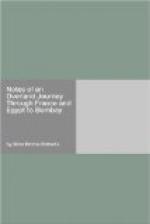We had a magnificent thunder-storm just as it was growing dark, and the red lightning lit up the pyramids, which came out, as it were, from the black masses of clouds behind them, while the broad waters of the Nile assumed a dark and troubled aspect. The scene was sublime, but of short duration; for the tempest speedily rolled off down the river; when, accompanied by a squall and heavy rain, it caught several boats, which were obliged to put into the shore. We did not experience the slightest inconvenience; and though the latter part of the voyage had been protracted from want of wind, arrived at the port of Boulak at half-past nine on the second evening of our embarkation.
CHAPTER V.
* * * * *
CAIRO.
* * * * *
Arrival at Boulak—Description of the place—Moolid, or Religious Fair—Surprise of the People—The Hotel at Cairo—Description of the City—The Citadel—View from thence—The City—The Shops—The Streets—The interior of the Pasha’s Palace—Pictures—Furniture—Military Band—Affray between a Man and Woman—Indifference of the Police to Street Broils—Natives beaten by Englishmen—Visit to an English Antiquary—By-ways of the City—Interior of the Houses—Nubian Slave-market—Gypsies—Preparations for Departure to Suez—Mode of driving in the Streets of Cairo—Leave the City—The Changes in travelling in Egypt—Attractions of Cairo.
It was half-past nine o’clock, on the evening of the 4th of October, 1839, that we arrived at the port of Boulak. We expected to find some person in waiting to give us the pass-word, and thus enable us to get into Cairo, the gates of the city being closed at nine o’clock. Depending upon the attendance of the hotel-keeper at Cairo, who had been apprised of our approach, we had not put the janissary on shore, as we ought to have done, at the British Consul’s country-house, who would have furnished us with a talisman to pass the gates. We sent Mohammed and the janissary on shore, to see what could be done. Including the voyage up the canal, Miss E. and myself had passed (we could not say slept) three nights on board a boat, the first without an attempt at repose, the two latter lying down in our dressing-gowns upon thin mattresses, stretched upon hard boards; we, therefore, could not very easily relinquish the endeavour to procure a bed during the time which would intervene between the period (an hour before day-light) in which the gates of the city would be open.
I had a letter to the British Consul, which I gave Mohammed, telling him to try the effect of bribery upon the guardians of the city. During his absence, the Arab captain, feeling that we were left under his protection, came and seated himself beside us, outside the cabin-door. We conversed together without understanding each other’s language; he had nothing to offer us except snuff, of which we




